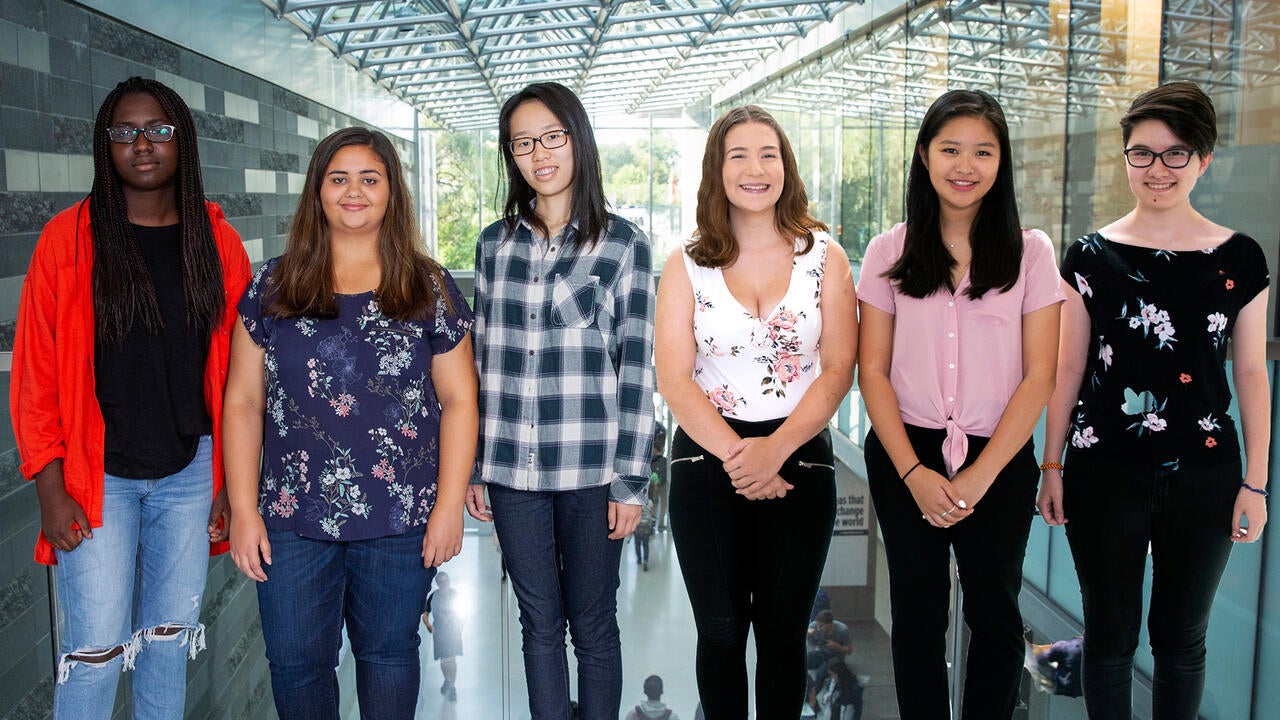
HeForShe scholarships awarded to exceptional first-year STEM students
Students pursuing programs in science, technology, engineering or mathematics at the University of Waterloo recognized with $12,000 scholarships.

Students pursuing programs in science, technology, engineering or mathematics at the University of Waterloo recognized with $12,000 scholarships.
By Natalie Quinlan University RelationsThe University of Waterloo has awarded six first-year students with HeForShe IMPACT scholarships in the fields of science, technology, engineering or mathematics. The scholarships are part of the University of Waterloo’s commitment to encourage more young minds to pursue careers in STEM, an area where those who identify as women or non-binary groups are currently underrepresented.
Waterloo is the only Canadian university taking part in the UN Women’s HeForShe IMPACT 10x10x10 initiative to achieve gender parity. As part of this initiative, the University aims to increase representation for female or those who identify as female and non-binary in STEM education and careers, faculty representation, and senior university positions.
Each recipient has a unique story that’s fueled their interest in STEM. Here's a look at how they are pursuing their passions.
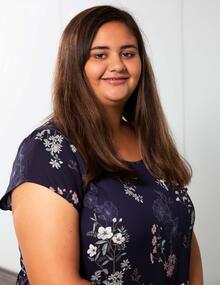 Adrianna D’Sa – Chemistry
Adrianna D’Sa – ChemistryFor as long as Adrianna D’Sa can remember, she has always been curious about how the world works. As a child, visiting science museums and creating at-home science experiments were staple activities in the D’Sa household.
Now 18, D’Sa’s remained intrigued with the world of STEM and the endless possibilities that vast amounts of information and knowledge offer.
“Professionals in STEM are constantly learning, and they use that knowledge to create things that most people can only dream of,” says D’Sa. “There is never a dull moment when it comes to the field of STEM, as it is constantly evolving and advancing.”
In the future, D’Sa looks forward to creating products that will benefit society, and learning from experienced professionals in the field.
“To all the women considering STEM, do not be discouraged because it is a male-dominated field,” says D’Sa. “If you love STEM, then pursue it — don’t let anyone tell you that you can’t. With hard work and a positive attitude, you can accomplish great things.”
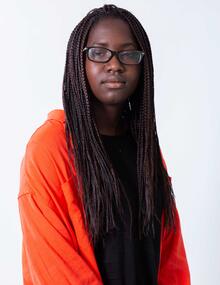 Isemi Ekundayo – Computer Engineering
Isemi Ekundayo – Computer Engineering Isemi Ekundayo remembers her first experience with STEM, particularly engineering, in third grade.
“A professional engineer visited my school to give a presentation about the different engineering disciplines available, and their potential career paths,” says Ekundayo. “I thought it was awesome that a field existed that would easily allow me to apply my knowledge from classes on real-world projects.”
Ekundayo hopes to put her degree in Computer Engineering to bettering and changing the world, and looks forward to working with other professionals in the field.
“Being able to surround myself with [passionate and motivated individuals] will allow me to significantly grow as a person,” says Ekundayo. “I am excited to immerse myself in the world of STEM and encounter an abundance of innovative thinkers.”
As a female pursuing Computer Engineering, Ekundayo hopes her story will also resonate with others interested in education or careers in STEM.
“There are those that will try to relate your success to being a minority in the field, but don’t let that take away from any of your accomplishments,” says Ekundayo. “The more women that succeed in a STEM field, the easier it is for other women to feel like they have the ability to make an impact in STEM.”
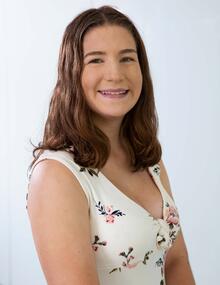 Lindsay Toffolo – Computer Science
Lindsay Toffolo – Computer Science Lindsay Toffolo says she’s been fortunate to grow up surrounded by STEM.
“My dad is an electrical engineer, and my mom is a chemical engineer and math teacher,” says Toffolo. “I grew up knowing that I would have a career in STEM.”
With the support and encouragement of her Grade 10 teacher, Toffolo began to realize her love of problem-solving in the world of computer science.
“He’s why I’m here today,” says Toffolo. “STEM is how we solve problems, how we develop our world, how we manage to push the boundaries of what is possible. But it’s also how we support everything we have now: our economy, manufacturing process, our education system, our communication — everything.”
As for advice she’d give to others pursuing the field of STEM, Toffolo encourages everyone to simply go for it.
“Don’t let your gender factor into your future because it has absolutely nothing to do with what you can contribute,” says Toffolo. “There may be the occasional instance where you feel undervalued due to your gender, but this is increasingly rare. Besides, nothing feels better than proving people who doubt you, wrong.”
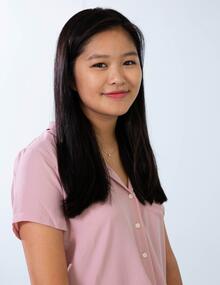 Megan Lai – Mechatronic Engineering
Megan Lai – Mechatronic Engineering From a young age, Megan Lai has been inspired by STEM — the field her mother also pursued. Starting her STEM experience early-on in life, Lai was the first girl to join the robotics team at her school. While Lai felt her ideas weren’t always given the same merit as the ones put forward by the boys, Lai didn’t get discouraged.
“Instead of giving into the stereotyping of girls not belonging to STEM, I set out on a mission to change that,” says Lai. “I formed an all-girls team to build and program autonomous robots.”
With hard work and innovation, Lai’s team achieved great success at provincial and international competitions. The experiences solidified her desire to become an engineer.
“I believe that robots will become an integral part of our everyday life in the foreseeable future,” says Lai. “Men are not from Mars and women are not from Venus — we are all from the same planet. Diversity of thoughts and creativity will always guarantee better engineering.”
Lai is looking forward to the co-op program which she believes to be a powerful segue between academics and industry.
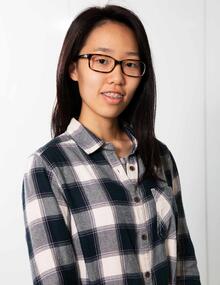 Sally Zhou – Computer Science
Sally Zhou – Computer Science Sally Zhou’s introduction to the field of STEM began in a Grade 9 computer science class, where she quickly realized all her interests could be collected into one entity.
“I’ve interacted with computers since I was a child, but never in a programming sense and as it happens, I found the experience to be really fun and enjoyable,” says Zhou.
Since then, Zhou’s passion for STEM has only grown. While she admits that the work has been hard, the experience has been worthwhile.
“Quite literally, our world depends on STEM,” says Zhou. “This field impacts every part of our lives and is critical to bettering lives. I believe it’s important to expand the skills that I have in order to be involved in a field that is bound to play an even greater role in the future.”
As Zhou pursues her degree in Computer Science, she hopes to experiment with many different fields through Waterloo’s co-op program.
“I’m looking forward to interacting with new technologies and conducting research for exciting innovations.”
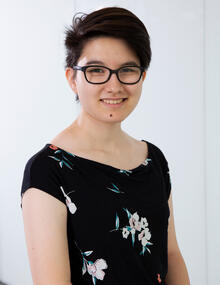 Sarah Moser – Mathematical Physics
Sarah Moser – Mathematical Physics Astronomy books, gifted to Sarah Moser at a young age, were the first introductions to STEM for Moser. Now 18, the first-year Mathematical Physics student is eager to network with others who share a passion for science and math.
“My high school teachers were the ones who convinced me study STEM in post-secondary,” says Moser. “I had good luck, having amazing math and science teachers who basically opened my eyes to how cool science is.”
Thanks to these teachers, Moser was inspired to take on this career choice and hopes to create technologies that will continue to make the world a better place.
“STEM is where all the important discoveries happen in our world today,” said Moser. “The discoveries being made in STEM are making the entire world a better place. And since I’m generally a pessimist, I tend to see a lot of bad thing in the world, but STEM provides me with a way to make a difference and make things at least a little better.”

Read more
Here are the people and events behind some of this year’s most compelling Waterloo stories

Read more
Meet five exceptional Waterloo graduate students crossing the convocation stage as Class of 2025 valedictorians

Read more
Meet the 14 exceptional students representing Waterloo’s newest grads
The University of Waterloo acknowledges that much of our work takes place on the traditional territory of the Neutral, Anishinaabeg, and Haudenosaunee peoples. Our main campus is situated on the Haldimand Tract, the land granted to the Six Nations that includes six miles on each side of the Grand River. Our active work toward reconciliation takes place across our campuses through research, learning, teaching, and community building, and is co-ordinated within the Office of Indigenous Relations.